'I want to be the best in the world' - sitting down with Chloé Dygert
A crash in the time trial thwarted Chloé Dygert's Olympic triple effort, but she's still got the track and road race to go. Chris Marshall-Bell sits down with the enigmatic American to find out what makes her tick
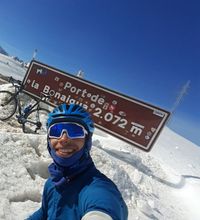
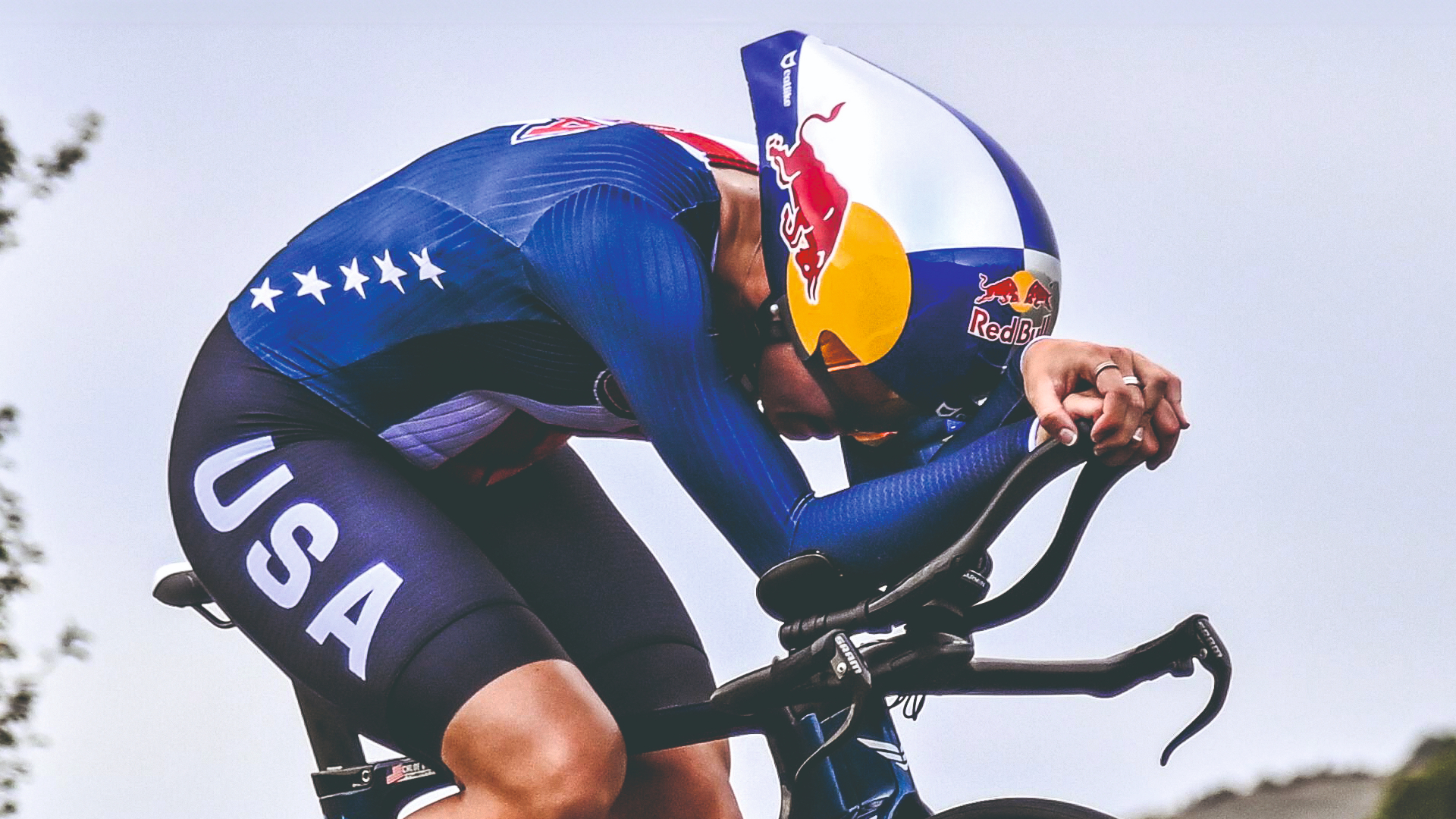
The latest race content, interviews, features, reviews and expert buying guides, direct to your inbox!
You are now subscribed
Your newsletter sign-up was successful
There is a big secret about Chloé Dygert: she doesn’t like bikes. The rumour has it that the reigning time trial world champion became a professional cyclist only because of a family bribe – and that she has no interest in the sport or its history. “That’s true! That’s absolutely true,” the American surprises me, verifying what I had assumed was a myth. “I don’t like to train, but I do like to win,” she elaborates. “I do have bad days and I do struggle when I don’t want to ride a bike, but I have been very blessed with the drive, motivation, structure and discipline to be able to do so. And when I do have a good day, it’s all worth it. I love winning, and I love what comes after that because ‘next’ is always a bigger and better thing.”
Nothing is bigger or better than an Olympic gold medal, and the 27-year-old cyclist who doesn’t really like cycling, could feasibly pick up two of them. Going into the Olympic Games, she was a favourite for three, but took bronze in the time trial after a heavy crash on the Paris cobbles.
“I’m going to do everything I can to get those gold medals and if it doesn’t happen, well...” she pauses. “Well, that’s an interesting question because I’ve not thought about what happens if I don’t,” she said, speaking to Cycling Weekly ahead of the start of the 2024 Games.
Stubbornness and indestructible self-belief bolster Dygert’s prodigious talent; she has everything it takes to dominate the sport on the road as she has the track for the past decade. Her reputation, however, is far from unblemished, and is often preceded by her controversial views. A complex and mysterious individual who has made multiple against-the-odds comebacks and who has 12 junior and senior World Championships to her name, Chloé Dygert is one of a kind. “This is God’s plan,” she says of her roadmap to Olympic immortality. “If it’s God’s will, there will be a way.” These days, in a sport that is largely secular, mostly European, Dygert’s religious devotion sets her further apart from the pack.
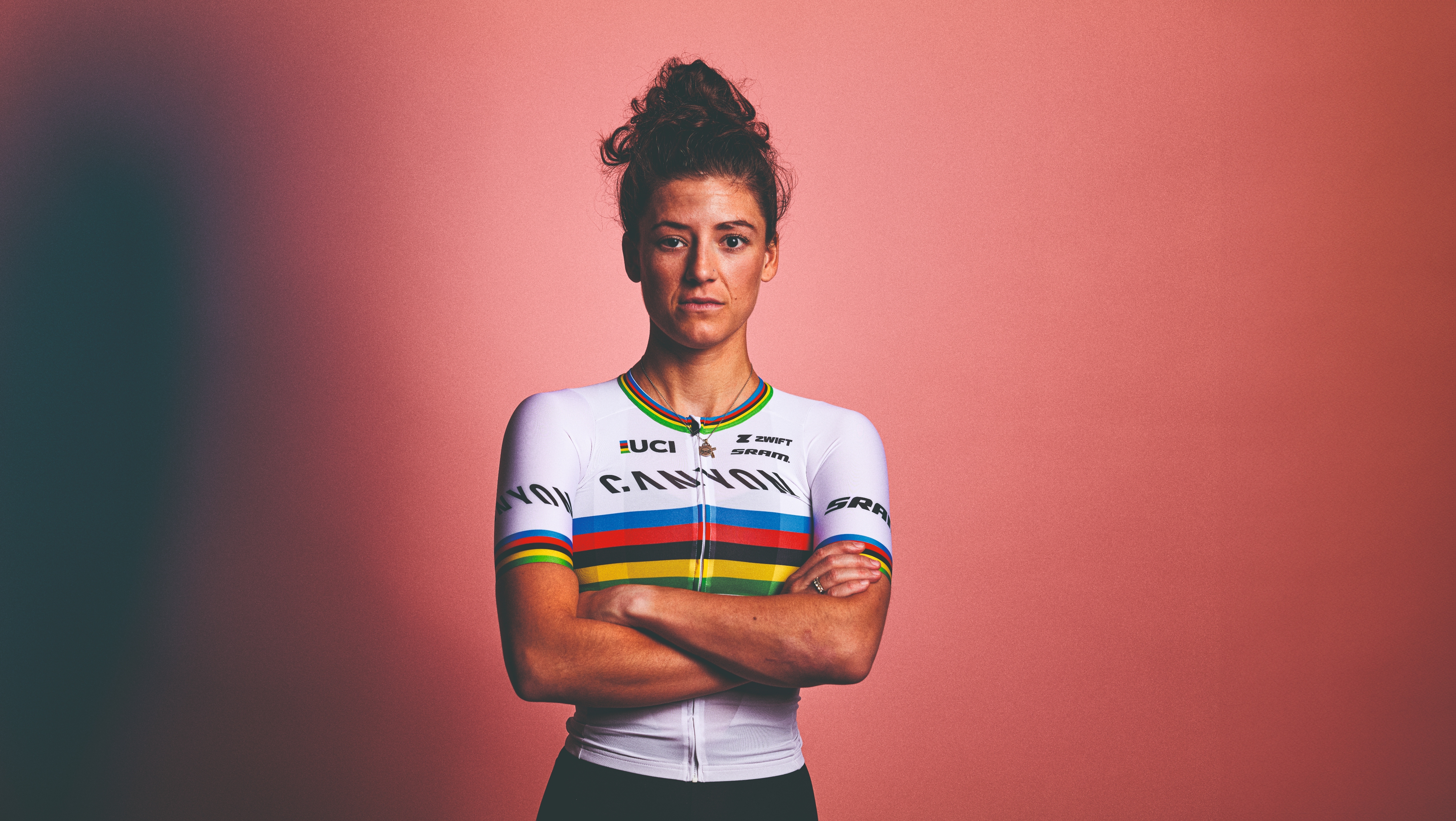
Dygert picked up a bronze medal in the time trial at the Paris Olympics
Overcoming adversity
To understand Chloé Dygert and what makes her tick, we have to wind the clock back 27 years. Born in Brownsburg, a small town in Indiana, the younger of two siblings was first obsessed with basketball and then running. “But every sport I did, I got hurt all of the time,” she tells me via video call, in April, speaking from her home in Belgium where she lives with ex-pro and partner Axel Merckx. While playing basketball, she tore her anterior cruciate ligament, broke her nose and sprained her ankles, shoulder and thumb; during her running days, she suffered stress fractures and damaged an Achilles tendon.
During her teenage years she built up resilience, responding to knock-downs with a get-back-up attitude. At 16, the formative episode: “My dad [David] and brother [Gunner] cycled, and they bribed me into giving it a go by saying, ‘If you use your brother’s Zipp wheels and win, you can get a pair of Oakleys.’” The plan worked. “I didn’t know anything, but my dad was telling me that the things I could do on a bike were not normal for a little kid. He effectively talent ID’d me and really pushed me into racing.”
Eleven years on, she has twice been a senior time trial world champion, reset the individual pursuit world record four times, won just as many team pursuit world titles, and picked up a bronze and silver in the TP at the last two Olympic Games. But those achievements don’t appear to have brought her fulfilment. “To be honest,” she says, “I don’t think I’ve even got started.” The lack of satisfaction is primarily attributable to the all-too frequent obstacles that have thwarted her progress.
The latest race content, interviews, features, reviews and expert buying guides, direct to your inbox!
At the 2020 World Championships in Imola, Italy, she was on her way to successfully defending her time trial title from Yorkshire the year before when she crashed over a guardrail, suffering a severe laceration to her left leg. During her two-year recovery she had two leg surgeries, contracted Epstein-Barr virus, and then had to undergo heart surgery after being diagnosed with supraventricular tachycardia, which caused her heart rate to sporadically spike to 210-220bpm. Dygert somehow managed to compete at the delayed Tokyo Olympics, winning team pursuit bronze, but raced just once for Canyon-SRAM in her first two seasons after joining them at the beginning of 2021.
It was a tough period, and she admits that she lost her sense of purpose and considered quitting the sport at 24. “It was hard, frustrating, and I’m not going to sit here and say it was fun, but throughout my whole sporting life it’s been one setback after another,” she says, “but I’ll never let it affect me. I have so many achievements, goals and races that I want to accomplish and I’m trying to learn from my mistakes, setbacks and illness to make everything and every day better.” It is said with steely resolve. “Nothing and nobody is going to change that mindset of mine. Nothing can keep me from continuing to push through.”
Social media scandal
I’m intrigued to know whether the mistakes she refers to include the missteps that have tarnished her reputation. In 2020, she ‘liked’ on X (then Twitter) a series of racist and transphobic posts, and though she subsequently issued an apology, she recognises her public perception was harmed. “I think my reputation has maybe been ruined a little bit from it,” she acknowledges. “What happened in the past was very unfortunate but it has definitely made me a better person and I’ve learned a lot.”
Does she regret her actions? “Who I am and who I want to be is who I want to portray myself as on social media,” she says. “I don’t really need people to like me or to have a good reputation or good comments behind me, because that’s not going to make me lose or win a bike race. I want to be a follower of Christ, and I want people to know I’m not afraid to show my love for God.”
Dygert speaks of her relationship with God as though it is the one constant in her life. “God is amazing,” she effuses. “The miracles He can do and the joys He gives to people’s lives are unbelievable. I have butterflies in my chest just thinking about it.” At the Glasgow World Championships last summer, beset by sickness, Dygert found herself “on my hands and knees, just praying” that she’d be able to take to the startline of the time trial. She did – just – and then won. “It was such an eye-opening experience for me with my relationship with God: I didn’t ask for the ability to win; I asked for the strength to accept that whatever happened, happened,” she says. “Normally, if I lose or have a bad day, I’ll become and stay mad, but this time I was so calm, relaxed and ready to accept the outcome.
“I’d spent three years building up to that moment, and despite everything, I won by six seconds. That, to me, was the grace of God.”
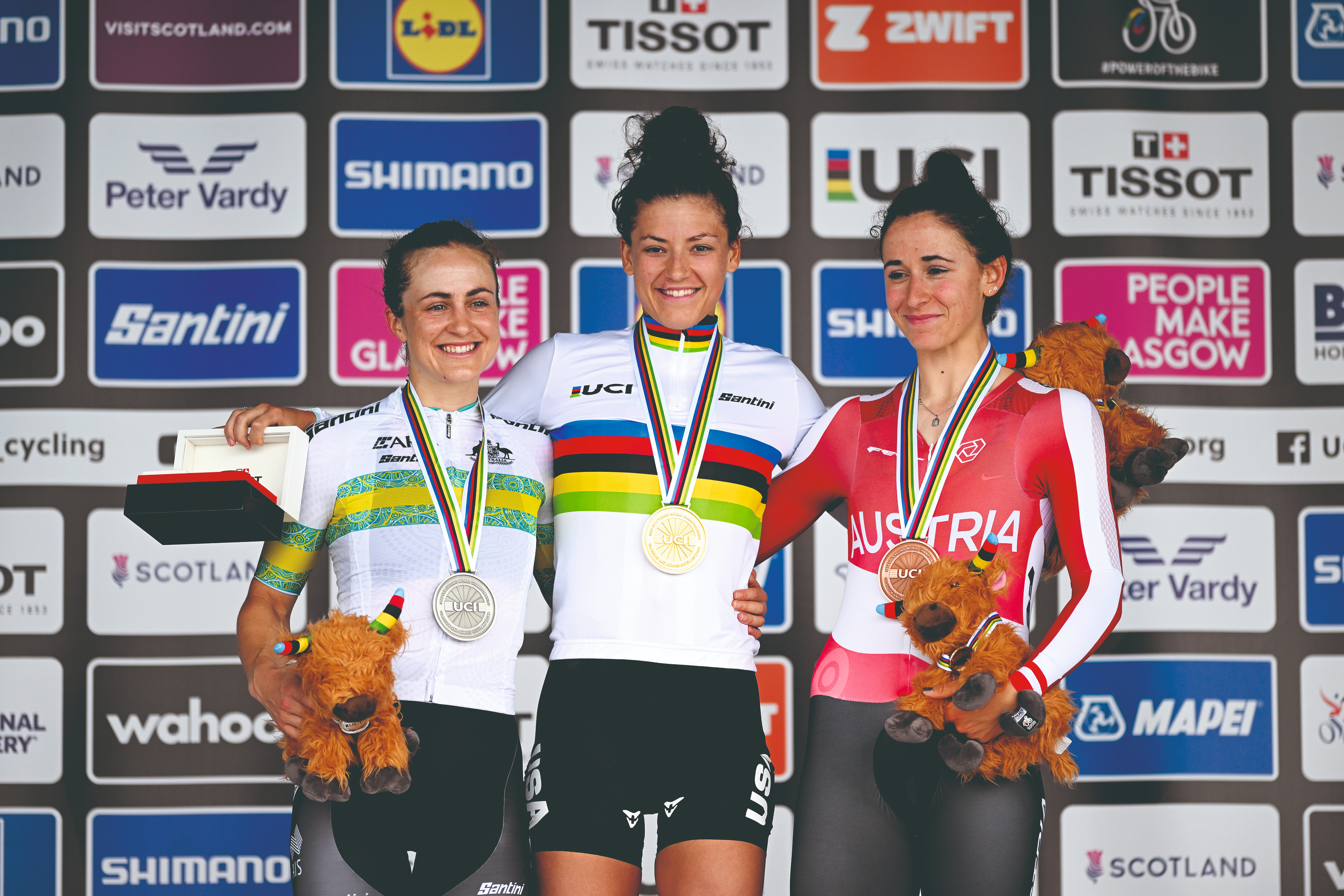
2023 Worlds TT podium (l-r): Grace Brown, Dygert, Christina Schweinberger
Athletic epiphany
Dygert’s performance in Glasgow was certainly extraordinary. “I’m looking at her TrainingPeaks right now,” her coach Kristin Armstrong tells me via video from her home in Boise, Idaho, “and the five days before, she was sick and barely able to ride. How she got through that and won was the power of her mind. She really wanted those rainbow stripes.” Armstrong, a three- time Olympic time trial gold medallist between 2008 and 2016, has worked with Dygert since 2016. “Her mindset is what makes Chloé so very special,” Armstrong adds. “She has a no-pain filter and this superpower where she is able to accept and go way beyond what a normal person can do. She can visualise success like I’ve never seen from anyone else before. When she has a setback, she comes back stronger.”
I’m beginning to understand the passion that fuels Dygert: she wants to transcend earthly ordinariness. “There have only ever been two days in my life where I can remember being flawless,” she says. “One was the Worlds time trial in Yorkshire in 2019, and the other was when I was younger and running. It’s a feeling of calmness, quietness, silence, and one where when you look down at your power meter and it looks like you’re going too hard or fast, yet you’re nose-breathing, your legs are fine, and you don’t feel the lactic acid or struggle. It’s one of the best sensations I’ve ever felt and I strive to feel it again.”
Dygert’s road career has yet to take off and she admits to lacking bunch skills, but after Paris she will make her Tour de France Femmes debut, before focusing on the Classics next year. “I truly believe I’ve not even begun on the road, and I don’t think any of us know what I can do,” she says.
Typical Dygert, her ambitions are lofty: only domination will do. “Next year I want to focus on Roubaix and Flanders and other races I want to do well in, and then I want to win them,” she states. “In a humble way, I want to be the best in the world.”
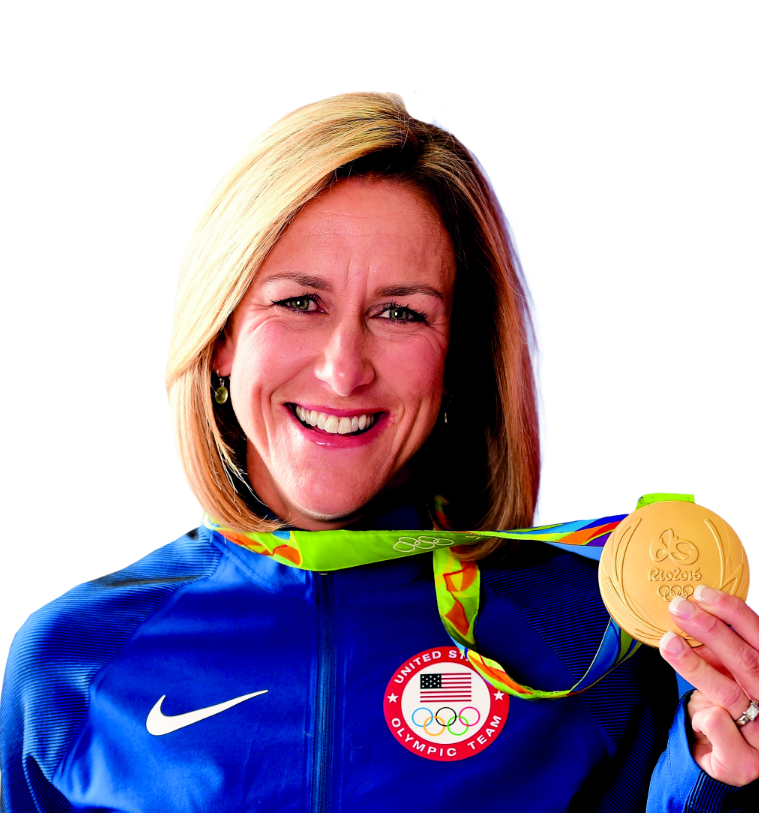
Kristin Armstrong has been Dygert's coach since 2016
Meet the coach: Kristin Armstrong
In 2015, Chloé and I were team-mates on the Twenty16 team. She realised what was possible because she watched me win Olympic gold as a 42-year-old while she was on the podium of the Olympics as a 19-year-old. Since then, we’ve developed a wonderful relationship where she challenges me and I challenge her.
I specifically chose my teams based on being able to focus on the Olympic Games and to control my work and race-load. It’s very difficult to peak for the Spring Classics and then have another peak in the summer. Canyon-SRAM is perfect for Chloé: she had a rollercoaster of a ride with her accident and they held her hand throughout it – every person on Canyon- SRAM cares about Chloé and wants her to succeed.
We started Olympic conversations in November, around the idea that Chloé is not a one-discipline athlete. Her focus is the time trial, but she’s Chloé Dygert – she wants to win everything. People look at how many days she has raced in Europe and ask how she could win the road race, but let me tell you, she is strong enough – she can podium in the road race.
Following God's plan
On 27 July, Dygert competed in her first of three Olympic events, a flat 32km time trial in which she was the outstanding favourite. Dygert had to settle for bronze after crashing on the Paris cobbles and losing 46 seconds on eventual winner Grace Brown.
Now, her attention switches to the Olympic road race on August 4. “There are so many variables, more luck is involved, but if I am fit enough I can be in contention.” She remembers finishing fourth at the 2019 Worlds in Harrogate, her first ever road race on European soil. “I proved then that I’ve got it.” Maybe she just needs wet and cold British conditions. “Yes!” she laughs. “I love weather like that – that is my thing.”
Across 6-7 August, she will race the team pursuit, the discipline in which she boasts two Olympic medals and four world titles. A hat-trick of medals is eminently possible, and she is even more focused on delivering than ever before. “I didn’t understand how unbelievable it was to be at an Olympics in Rio, and I took my time there for granted,” she reflects. “Tokyo was hard for me: it was Covid, it was too soon after my accident, I was not healthy, and it was one of the hardest times in my life.” In this context, Paris is a chance to make amends. “I go to Paris hoping to be 100%, with big goals, everyone behind me, and for the first time my family can come and see me at an Olympic Games.
Chloé Dygert might be on the verge of becoming cycling’s next all-American, all-conquering superstar, dominating in a sport she admits she doesn’t love. She would have been disappointed with the unfortunate events of the time trial, but she will be hoping for better results in the road race and in the velodrome. “You could say [expectation] comes with pressure, but I don’t think of it that way,” she insists.
“I don’t care about pressure. I will be showing up to win. That’s the goal. I have faith and trust that this is God’s plan for my life, and it’s up to me to accomplish His plan.”
A freelance sports journalist and podcaster, you'll mostly find Chris's byline attached to news scoops, profile interviews and long reads across a variety of different publications. He has been writing regularly for Cycling Weekly since 2013. In 2024 he released a seven-part podcast documentary, Ghost in the Machine, about motor doping in cycling.
Previously a ski, hiking and cycling guide in the Canadian Rockies and Spanish Pyrenees, he almost certainly holds the record for the most number of interviews conducted from snowy mountains. He lives in Valencia, Spain.
